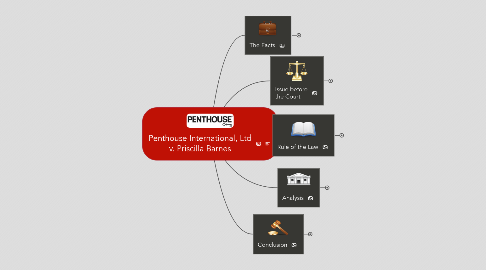
1. Issue before the Court
1.1. District court's grant of specific declaratory relief is reviewed for abuse of discretion. Specifically:
1.1.1. 1. Did photographer Jeff Dunas act within his actual authority when he added "AKA" to Penthouse's printed form contract? (i.e, Could his acts could be construed as the acts of an agent of Penthouse?)
1.1.2. 2. Was the District Court in error when it interpreted the "AKA" term to mean that Penthouse could not publish the photographs under Barnes' true name?
1.1.3. 3. Did the District Court abuse its discretion by fashioning a remedy that ordered Penthouse to refrain from publishing entirely and to return the transparencies to Barnes?
2. The Facts
2.1. The Parties
2.1.1. PLAINTIFF: Penthouse Int'l, Ltd
2.1.1.1. Publisher of Penthouse, a monthly magazine that offers a mix of tabloid journalism with provocative photos of nude women, dubbed Penthouse Pets
2.1.2. DEFENDANT: Priscilla Barnes
2.1.2.1. Model/Actress best known for her role on the 70's/80's TV show "Three's Company"
2.2. What Happened
2.2.1. Then a hostess at an LA nightclub, Barnes posed nude for the "Pet of the Month" photo layout in the March 1976 issue of Penthouse under the pseudonym Joann Witty.
2.2.2. Barnes signed a contract presented by Jeff Dunas, who was paid by Penthouse as a freelance photographer (although his name appeared on the masthead). Prior to Barnes signing the contract, Dunas added the handwritten term "AKA" to the contract. According to Barnes, she believed this contractually protected her true identity being published withe the nude photos.
2.2.3. Years later, Barnes achieved notoriety for her role on the TV show "Three's Company". National Enquirer and People magazine published a rumor that Barnes was Penthouse's 1976 centerfold.
2.2.4. In fall 1983, Penthouse decided in to republish Barnes' nude photos using her true identity.
2.3. Procedural History
2.3.1. Penthouse submitted their contract with Barnes to District Court seeking a declaratory judgement that they had the right to publish the photos with Barnes' name.
2.3.2. District Court ruled that Penthouse could not republish nude photos of Barnes under her true identity and ordered the magazine to return the photograph transparencies to her.
3. Rule of the Law
3.1. Existence of Agency
3.1.1. California Civil Code defines actual authority as “such as a principal intentionally confers upon the agent, or intentionally, or by want of ordinary care, allows the agent to believe himself to possess.”
3.2. Contract Interpretation
3.2.1. Under California law, the handwritten term “AKA” controls over typewritten terms for purposes of interpreting the contract.
3.2.1.1. If the terms of a promise are in any respect ambiguous or uncertain, it must be interpreted in the sense in which the promisor believed, at the time of making it, that the promisee understood it.
3.2.1.2. Any uncertainty in a contract is to be construed most strongly against the party who caused the uncertainty.
3.3. Declaratory Judgement Act
3.3.1. Provides the district court with the power to issue an appropriate order so as to effectuate a grant of declaratory relief.
4. Conclusion
4.1. Agency: District Court ruling AFFIRMED
4.1.1. The district court did not clearly err in finding that Dunas was a Penthouse agent acting within implied actual authority when he modified the contract.
4.2. Contract Interpretation: District Court ruling AFFIRMED
4.2.1. The district court did not err in determining that the addition of AKA modified the contract to mean that only a fictitious name could be used.
4.3. Relief: District Court ruling AFFIRMED in part, REVERSED in part, VACATED in part
4.3.1. Affirmed the District Court's order which directs Penthouse to refrain from publishing the photographs under Barnes' name
4.3.2. Reversed the district court order that Penthouse to return the transparencies to Barnes and to refrain from publishing the photographs entirely.
4.3.3. Vacated the issues of breach of contract because they were beyond the scope of the bifurcated portion of the case which was tried.
5. Analysis
5.1. Actual Agency
5.1.1. Penthouse carried Dunas' name on the masthead, gave him black contracts, and had him present contracts to models. He could reasonably be considered an agent of Penthouse.
5.1.2. Penthouse internal memoranda reflect an understanding among Penthouse employees that “AKA” added to a contract meant that Penthouse was to associate a fictitious name with a woman's photograph.
5.1.3. Dunas reasonably believed he was authorized to add AKA and modify the contract to require that only a fictitious name be used.
5.2. Contract Interpretation
5.2.1. Although California rules of contract interpretation require that the court first attempt to remove any uncertainty by interpreting the contract as a whole so as to give every term effect, once Dunas added AKA to the contract a question regarding the terms and the intent of the parties arose.
5.2.2. Once the conflict arose, the district court was free to look outside the four corners of the contract to parol evidence in an effort to discern the meaning of the terms and the intent of the parties.
5.3. Relief
5.3.1. Once the court determined Penthouse could not republish under Barnes' name, it was within the court's power to order Penthouse to act so as to preserve Barnes' rights.
5.3.2. The Declaratory Judgment Act provides the district court with the power to issue an appropriate order so as to effectuate a grant of declaratory relief.
5.3.3. Once the district court limited the trial to Penthouse's request for a declaratory judgment and limited discovery to events regarding the execution and interpretation of the contract, any findings regarding events in 1983 were outside the scope of the first stage of the trial.
5.3.4. The district court abused its discretion by considering events outside the scope of the first part of the bifurcated trial in ordering Penthouse not to publish the photographs at all and to return the transparencies to Barnes.
